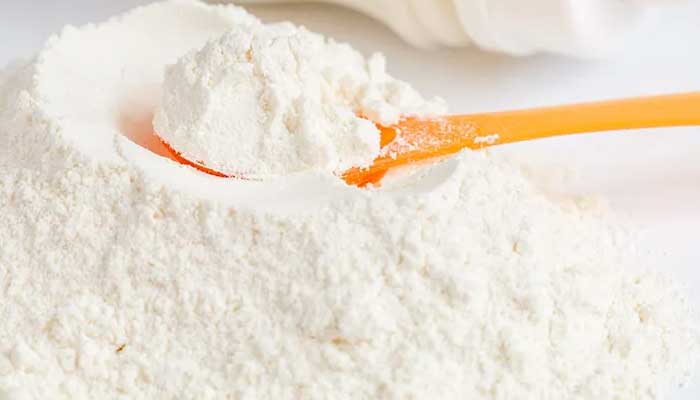17pc GST on local formula milk to hinder nutrition goals
LAHORE: Proposed imposition of 17 percent general sales tax (GST) on locally produced milk formula would derail efforts aimed at addressing the serious issue of child malnutrition in the country.
According to insiders, the recent proposal by the federal government to impose 17 percent sales tax on locally produced infant formula and baby food was contrary to the promise made by the prime minister in addressing the challenges of malnutrition in Pakistan.
Commenting on the reports that under the proposed mini-budget, sales tax on locally produced infant milks and cereals would be increased from zero percent to 17 percent in one go, they said it would negatively impact consumer price and nullify the PM’s promise made to address malnutrition.
Locally produced milk formula is used on a large scale as prescribed under certain medical conditions as well as general use for providing nutritious food to infants and babies. These products are about 50 percent cheaper than similar imported products.
Pakistan is facing a crisis in terms of malnutrition that is among the worst in the world, they observed.
An important index of health and nutritional status of a community is its “under-five mortality rate.” For Pakistan, it is 137 for 1,000 births. That is very high, by international standards.
According to nation-wide food consumption surveys, 40 percent of children in Pakistan are underweight and over half of the children are affected by stunting.
Furthermore, in Pakistan, about 41.7 percent of women of reproductive age are anaemic, with a slightly higher proportion in rural (44.3 percent) than urban setting (40.2 percent).
As per the last published National Nutrition Survey, other micronutrient deficiencies in Pakistani women are that of Vitamin D (79.7 percent) and Vitamin A (27.3 percent), which makes them vulnerable as young mothers.
Considering the high inflationary climate, it is imperative to note that locally produced infant nutritional products are priced at 50 percent less than imported ones, making it affordable and accessible to overcome under nourishment.
Prime Minister Imran Khan in his first address had drawn attention to the impact malnutrition and substandard food had on the mental and physical development of children, and had clarified the government’s priorities for prevention of stunting.
According to UNICEF, nearly 10 million Pakistani children suffer from stunting. The situation remains quite dire in the country, with stunting and wasting heavily prevalent.
Stunting does not only mean that a child does not have enough to eat. It is about the quantity and quality of diet besides other factors. Inadequate nutrition among mothers during pregnancy is one of the main reasons of malnutrition among children leading to stunting.
-
 James Van Der Beek's Final Conversation With Director Roger Avary Laid Bare: 'We Cried'
James Van Der Beek's Final Conversation With Director Roger Avary Laid Bare: 'We Cried' -
 Jaden Smith Walks Out Of Interview After Kanye West Question At Film Premiere
Jaden Smith Walks Out Of Interview After Kanye West Question At Film Premiere -
 Michelle Obama Gets Candid About Spontaneous Decision At Piercings Tattoo
Michelle Obama Gets Candid About Spontaneous Decision At Piercings Tattoo -
 Why Halle Berry Wasn't Ready For Marriage After Van Hunt Popped Question? Source
Why Halle Berry Wasn't Ready For Marriage After Van Hunt Popped Question? Source -
 Bunnie Xo Shares Raw Confession After Year-long IVF Struggle
Bunnie Xo Shares Raw Confession After Year-long IVF Struggle -
 Brooks Nader Reveals Why She Quit Fillers After Years
Brooks Nader Reveals Why She Quit Fillers After Years -
 Travis Kelce Plays Key Role In Taylor Swift's 'Opalite' Remix
Travis Kelce Plays Key Role In Taylor Swift's 'Opalite' Remix -
 How Jennifer Aniston's 57th Birthday Went With Boyfriend Jim Curtis
How Jennifer Aniston's 57th Birthday Went With Boyfriend Jim Curtis -
 JoJo Siwa Shares Inspiring Words With Young Changemakers
JoJo Siwa Shares Inspiring Words With Young Changemakers -
 James Van Der Beek Loved Ones Breaks Silence After Fundraiser Hits $2.2M
James Van Der Beek Loved Ones Breaks Silence After Fundraiser Hits $2.2M -
 Disney’s $336m 'Snow White' Remake Ends With $170m Box Office Loss: Report
Disney’s $336m 'Snow White' Remake Ends With $170m Box Office Loss: Report -
 Travis Kelce's Mom Donna Kelce Breaks Silence On His Retirement Plans
Travis Kelce's Mom Donna Kelce Breaks Silence On His Retirement Plans -
 Premiere Date Of 'Spider-Noir' Featuring Nicolas Cage Announced
Premiere Date Of 'Spider-Noir' Featuring Nicolas Cage Announced -
 Pedro Pascal's Sister Reveals His Reaction To Her 'The Beauty' Role
Pedro Pascal's Sister Reveals His Reaction To Her 'The Beauty' Role -
 Kate Middleton Proves She's True 'children's Princess' With THIS Move
Kate Middleton Proves She's True 'children's Princess' With THIS Move -
 Paul Anka Reveals How He Raised Son Ethan Differently From His Daughters
Paul Anka Reveals How He Raised Son Ethan Differently From His Daughters




